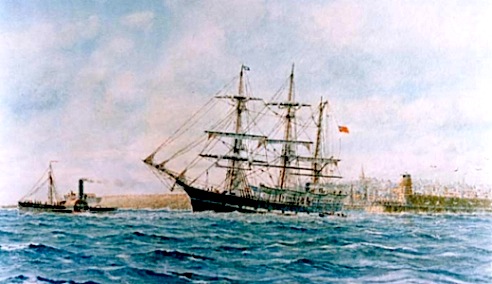Arthur Conan Doyle and the Arctic
 In the Spring of 1880 Arthur Conan Doyle, then a 21 year-old medical student, sailed as ship’s surgeon on board the Hope, an Arctic whaler, out of Peterhead. The Hope was a modern vessel with an auxiliary steam engine to go with its three masts, and in his brief reminiscence about the voyage, “Whaling in the Arctic Ocean” Conan Doyle says: “What surprised me most about the Arctic regions was the rapidity with which you reach them. I had never realised that they lie at our very door. I think that we were only four days out of Shetland when we were among the drift ice.”
In the Spring of 1880 Arthur Conan Doyle, then a 21 year-old medical student, sailed as ship’s surgeon on board the Hope, an Arctic whaler, out of Peterhead. The Hope was a modern vessel with an auxiliary steam engine to go with its three masts, and in his brief reminiscence about the voyage, “Whaling in the Arctic Ocean” Conan Doyle says: “What surprised me most about the Arctic regions was the rapidity with which you reach them. I had never realised that they lie at our very door. I think that we were only four days out of Shetland when we were among the drift ice.”
Doyle’s role on board ship was primarily as medical officer or surgeon, but in reality there was little for him to do but observe the scenery (and on several occasions fall into it), and to act as a companion for the ship’s captain, Captain Gray. It was customary, on board Greenland whalers, for the crew and captain to remain almost entirely separate, other than in the giving and receiving of orders, and in the captain’s briefings of harpooners and senior ship’s officers, so they often took along a companion for the seven month voyage.
Doyle concludes his short essay with the reflection that while he had stagnated intellectually during the voyage, the purity of the Arctic air had worked wonders for his physical health. But it seems to me that Doyle’s Arctic voyage, after which he completed his studies and qualified as a doctor, tells us quite a lot about his intellectual development. In particular it gives a context for the habit of observation and reflection that characterises his great literary creation, Sherlock Holmes.
By 1880 Arctic whaling was in decline. Doyle himself comments on the scarcity of “commercial” whales, notably the Bowhead whale, then known as the Greenland Right Whale, though he also mentions the relatively large numbers of Fin and Humpback whales, which were not pursued, being considered fit only for tallow. Sixty years earlier, when the whale fishery was at its peak, it was relatively common for scientists and adventurers to sail on whale ships in order to carry out experiments, or test theories. This was the tradition from which Doyle emerged, in his twenties, and it was in this spirit that he made his voyage north. Here, for instance, is his record of catching and killing seals, his rationalism overriding the horror of the slaughter, and expressing itself in terms of social criticism, for which he is not well known:
It is brutal work, though not more brutal than that which goes on to supply every dinner table in the country. And yet those glaring crimson pools upon the dazzling white of the icefields, under the peaceful silence of the Arctic sky, did seem a horrible intrusion. But an inexorable demand creates an inexorable supply, and the seals, by their death, help to give a living to the long line of seamen, dockers, tanners, curers, triers, chandlers, leather merchants and oil sellers who stand between this annual butchery on the one hand, and the exquisite, with his soft leather boots, or the savant, using a delicate oil for his philosophical instruments on the other.
But of course Doyle was also one for sensation, and there was plenty of that in the seas off Spitzbergen. On one occasion, in a boat alongside a whale in its death throes, the crew watched as the whale raised its fin high above them: “each of us held one hand up to stave off that great, threatening fin–as if any strength of ours could have availed if the whale had meant it to descend. But it was spent with loss of blood, and instead of coming down the fin rolled over the other way, and we knew that it was dead. Who would swap that moment for any other triumph that sport can give?”
Thankfully we do not speak of whaling as sport any more, but in this moment of peril, faced with the certain destruction of boat and crew, Doyle extracts a moment of thrilling terror worthy of Holmes himself. Doyle celebrated his twenty first birthday at 80 degrees north, but his claim to have come of age there had as much to do with experience as chronology. It is an intriguing thought that the death throes of a whale came close to depriving detection fiction of one of its cornerstones.

Fascinating stuff! I have been a fan of Sir Arthur Conan Doyle since I first read Holmes as a child. He also wrote on of the best historical novels that I have ever read- Micah Clark, about being on the losing side in the English Civil War. Thanks for the info- keep up the great blog.